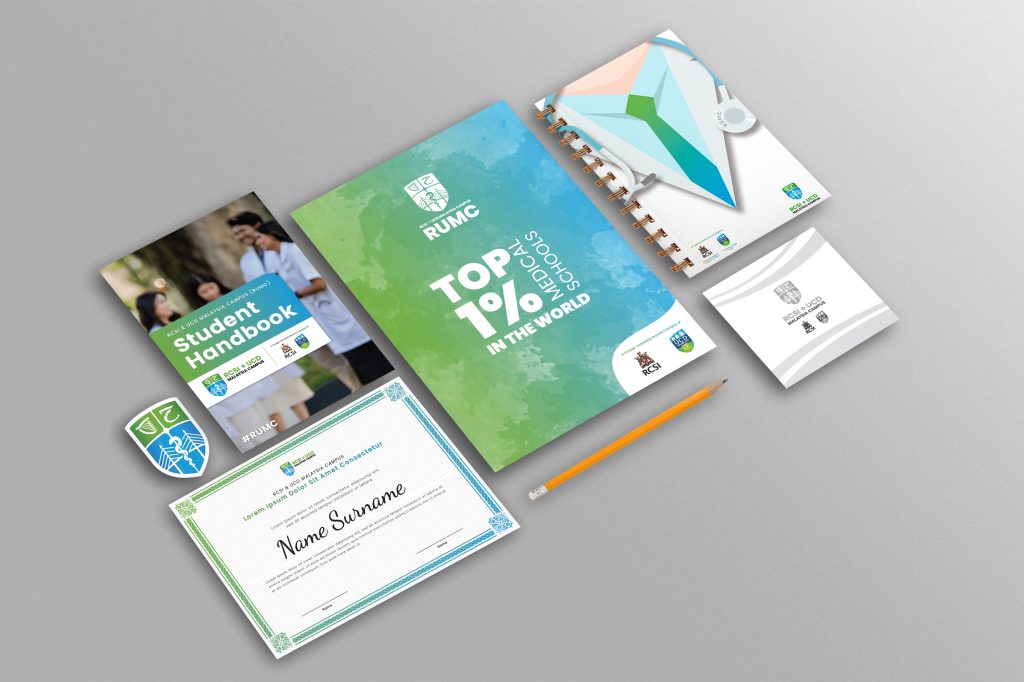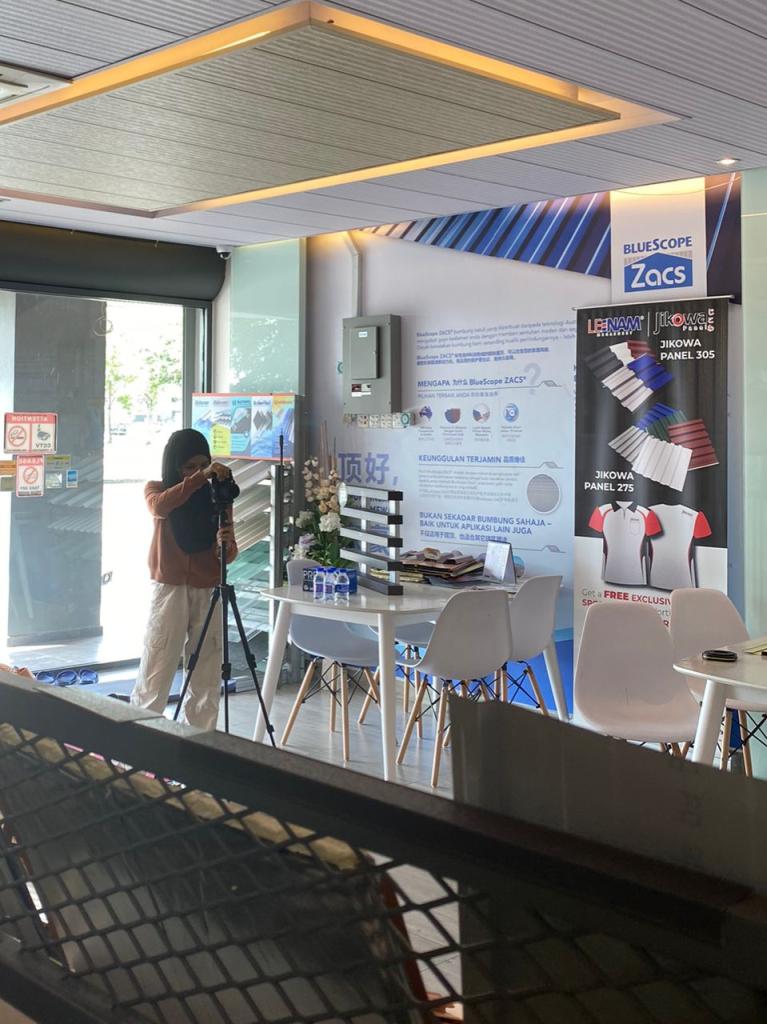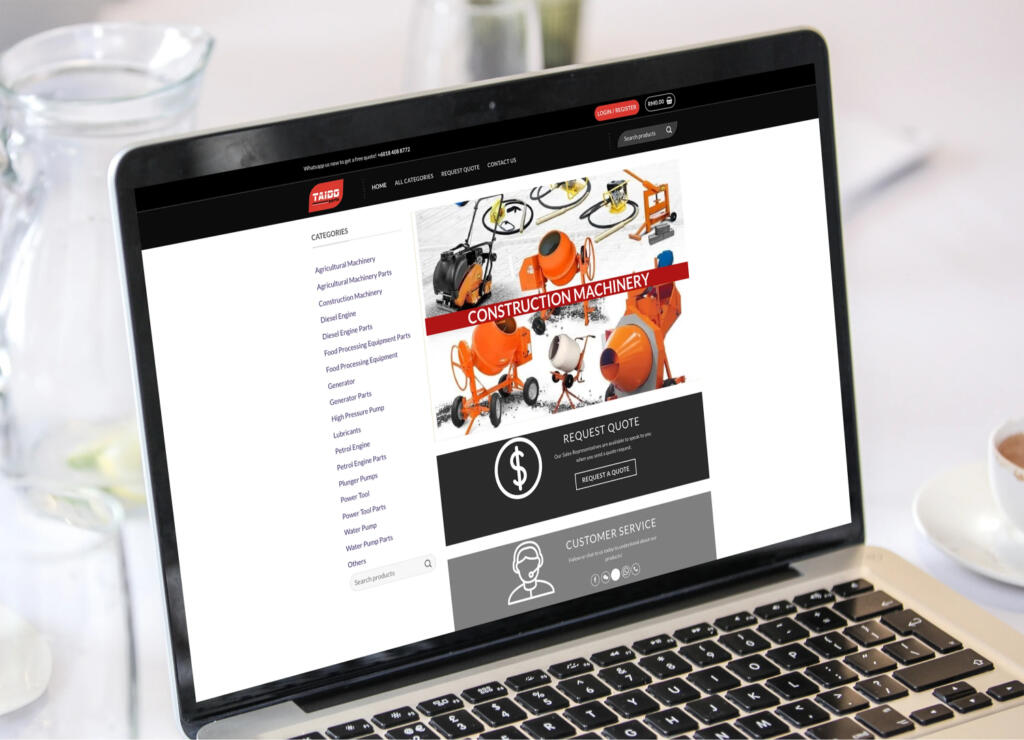Our top-tier consultancy services provide strategic guidance to elevate your entire digital presence.
Learn More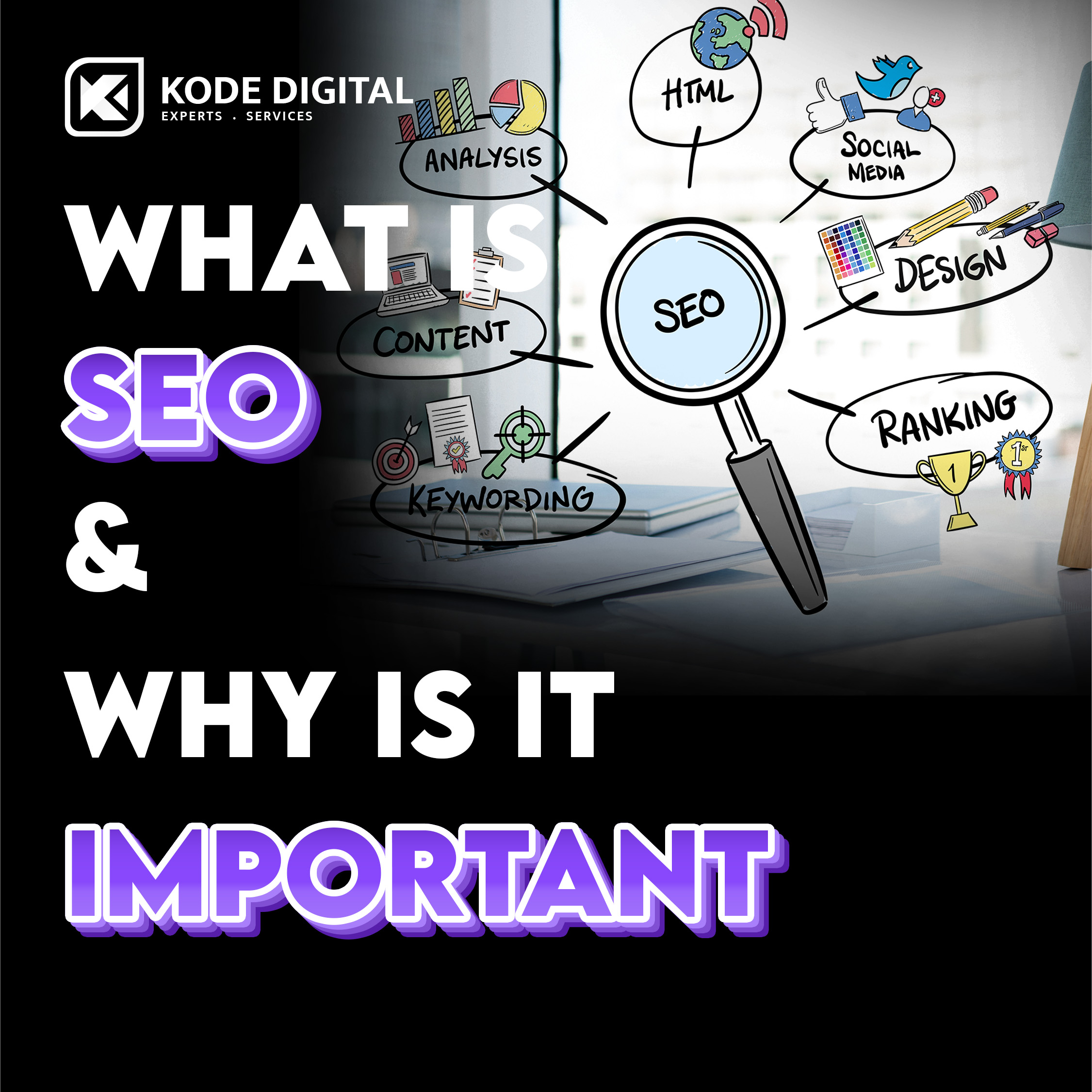
Contents
In today’s digital world, everyone is relying on search engines like Google to search for products or services. They are more likely to select a website on the first page of suggestions that the search engine shows them. Search Engine Optimization (SEO) is important to increase the brand’s searchability and visibility. Thus, it is a must to understand what SEO is and how it works to make your website more visible.
If you are ready to get started on SEO, continue reading this article. We will be covering the foundation of SEO, the importance of SEO, and SEO marketing strategies.
What is SEO?
Search Engine Optimization (SEO) is the practice of increasing a website’s ranking on search engine results pages (SERPs). A well-developed SEO strategy gives you the opportunities to draw organic traffic to your website while increasing your sales and revenue. The higher your Google ranking is, the more your brand will increase its visibility online. Besides, the users will instinctively identify your brand as a trustworthy expert in your field. Without SEO, consumers might not be able to know your brand’s existence at all.
If you feel SEO has evolved rapidly and growing more complex, you are not alone. As the demand for SEO is constantly increasing, Google will too, keep changing and tuning their algorithms all the time.
To allow you to better understand the importance of SEO, we have listed a few reasons why your website should be SEO optimized.
Why You Should Get Your Website SEO Optimized?
- In 2019, retail e-commerce sales worldwide amounted to 3.53 trillion US dollars and e-retail revenues are projected to grow to 6.54 trillion US dollars in 2022.
- 59% of shoppers say that being able to shop on mobile is important when deciding which brand or retailer to buy from.
If you have kept up with the latest marketing trends and statistics, you would probably know about the importance of implementing SEO strategies to your digital marketing plan.
Since the COVID-19 pandemic, SEO marketing is more important than ever. Our purchasing behaviours have changed significantly. Most of us are searching for basic needs online rather than going to retail. If you have a website, you should start implementing SEO to take your brand to the next level.
1. Consumers Trust Search Engines
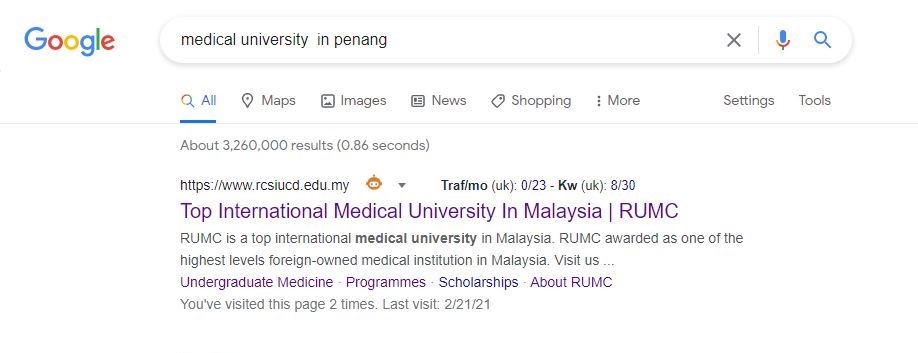
If your website is ranked top positions on the search results, the more likely the consumers will click on your website. Since you may be competing with 4 billion search results on a particular keyword, it is unlikely that the consumers will be scrolling through all pages to find their products or services. In short, the higher your website is ranked on search results, the more traffic your website will get
2. Improves User Experience
User experience plays a big role in SEO. Consumers want a website that is easy to navigate, to allow them to look for products or services much faster. Thus, having an obvious menu button and easy navigation between pages quickly and efficiently is important. Developing a website that is optimized for consumers, will, in return, increase your website traffic and conversions.
3. Local SEO Drives Qualified Traffic

Mobile traffic on search engines has been overtaking desktop traffic for years. Applying local SEO has become fundamental for every business regardless of the industry or business size. One of the ways is creating a Google My Business profile. It allows you to display your business information like website, location, operating hours, and phone number, so your customers can find you easily. Not only that, but it also allows Google reviews and Google Posts to keep your customers up to date.
4. SEO is Cost-Effective
If you are working with a tight budget, creating Google Ads may not be an optimal choice. Besides, when you stop spending money on ads, the leads will eventually dry up. Although SEO is slow progress where it can take up to 12 months to improve your website rankings on search results, it is more sustainable that brings long-term profitability.
SEO will certainly improve a website’s overall searchability and visibility, what are the ways to optimize a web page?
5. Stay Ahead of Your Competitors
Especially businesses that sell products or services in the most competitive industry like cafes and restaurants, education, property, etc, it can be hard to be ranked in the top position in the search queries. Consumers are less likely to scroll to the bottom of the page or click on the next page to find products or services they wish to find.
That is why optimizing your website with SEO is important. Not only SEO is a great tool to improve your search engine rankings, but it also helps you to stay ahead of your competitor.
How to Optimize Your Website with SEO?
SEO is built up from multiple technical elements that will impact the ranking of a website. There are two approaches you can implement to build on the search rankings of your website which are on-page and off-page SEO
- On-page SEO consists of aspects that you can implement on your own website.
- Off-page SEO refers to techniques you can implement off your website.
On-Page SEO
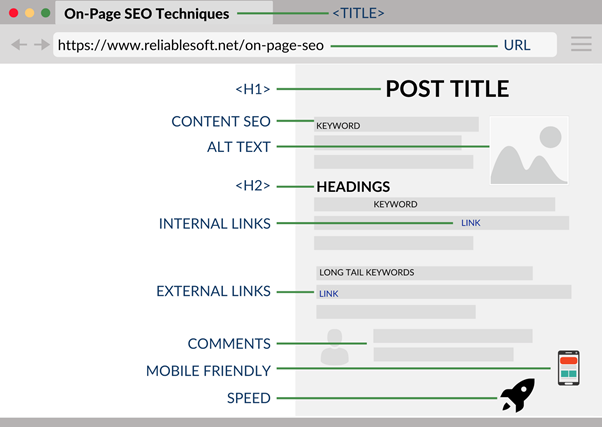
On-page SEO focuses on delivering search engine crawlers adequate signals for them to understand the meaning and context of your content. Since search engines do not read a page like humans do, instead they will be collecting signals to identify what a page is about. If it is applied correctly, on-page SEO will boost a website’s visibility in the search results.
Below is a list of the most used on-page SEO components that you can apply to your web page while doing on-page SEO.
1. Title tags
Place your focused keywords in the title tag of each page on your site. Each title tag should be unique, descriptive about what the page is related to. It should also be optimized with keywords and written below 60 characters in length. It is encouraged to use modifiers like “Best”, “Guide”, “Reviews”, “Cheap”, “Simple” and “Easy” to produce a more specific longtail keyword. These modifiers catch the attention of customers and enhance your website click-through rate.
2. Headings
Headings are the titles of your content and they should be set in H1 for the best outcomes. Keep in mind that your H1 tags are related to the keywords you are focusing on in your content. You can also make use of subheadings (H2 – H6) to divide the content and improve readability.
3. URL Structure
Place keywords into your URLs if possible. However, do not modify all your present URLs just so they have keywords in them. Renaming a page and forgetting to update your internal links may cause broken links. So, you should always remember to update the links immediately after you make any changes.
4. Alt text for images
Adding alternative text to an image gives search engines additional information about what kind of content you are trying to deliver. Therefore, the alt text should be precise and descriptive, optimized with a keyword if possible, and written below 125 characters in length.
5. Site Speed
Page load speed is the most important component in SEO since slow-loading pages lead to high bounce rates. 47% of people expect a site to load within two seconds or less, and 40% will leave a site that takes three or more seconds to load. As a result, search engines will penalize slow-loading pages with a lower ranking, so it is important to increase your site speed and improve user experience.
Here are some ways to improve your site speed using plugins on WordPress:
- Minimize HTTP requests
- Minify CSS, Javascript, and HTML
- Enable Gzip compression
- Minimize time to first byte
- Improve server response time
- Remove render-blocking JavaScript
- Enable browser caching
- Optimize image sizes
6. Internal Links
Internal links connect one page to another page on the same website. When Google has already crawled a web page that you connect to your new page, it will help Google to better understand what your site is about as well as index your page. Every page on your site should at least link back to its same category and to the homepage.
7. Meta Descriptions
A good meta description should be short yet clear descriptions that summarize a page’s content. The purpose is to tell the consumers why they should read your content instead of other sites’ content. The meta description should have remained under 160 characters. You also want to add your focused keyword in the description because Google bolds terms that match the search query.
8. Content
Quality content on a web page means higher search engine rankings. Thus, it is important to write good content that is worthy to be linked as a reference. It should be content that is original as Google AI is smart enough to detect any unoriginal content.
Keywords and keyword research are the keys to writing good content that is well-optimized with SEO. Many may have mistaken that keyword repetition or placement plays a big part in writing good content.
However, they are wrong. It is more towards content relevance, which means how relevant the information corresponds to a search query. One should create content that is in-depth, unique, and trustworthy, to increase more website traffic.
Off-page SEO
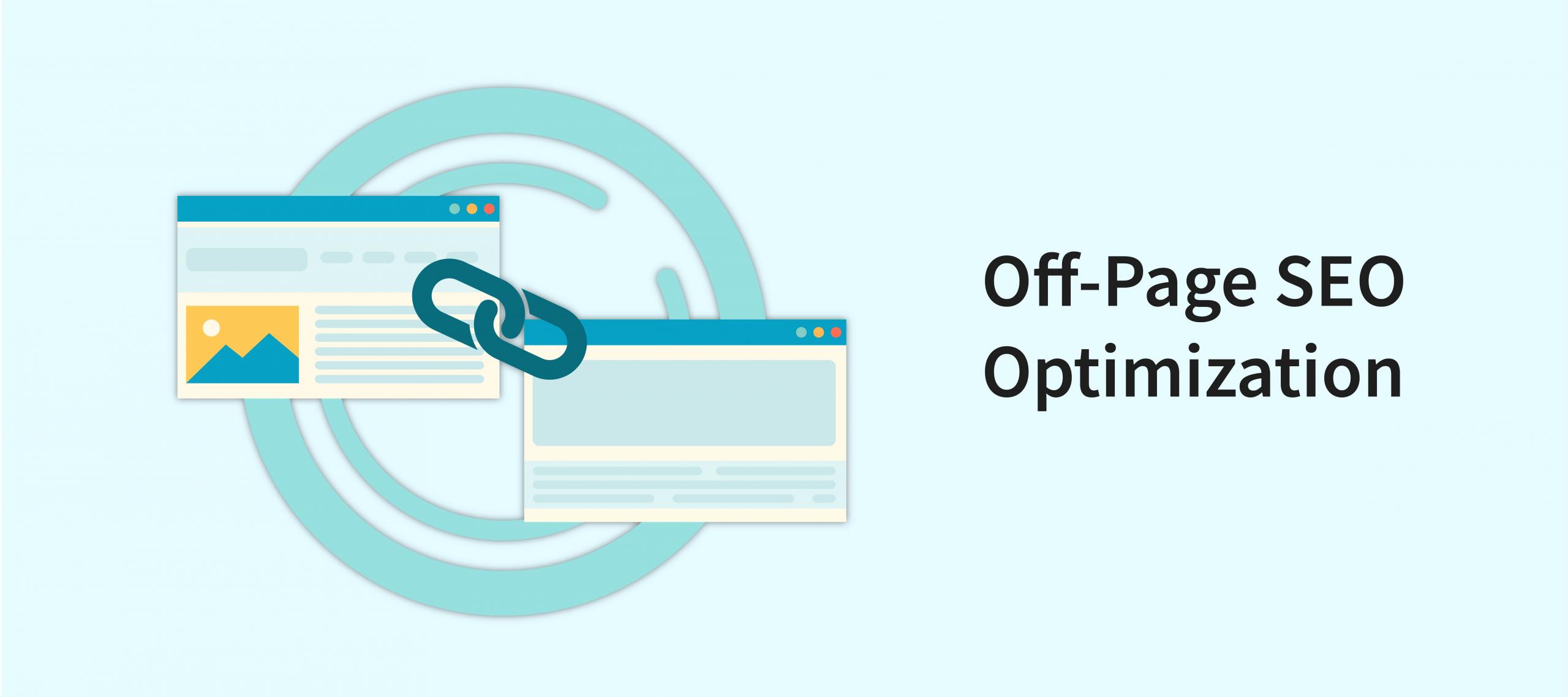
While on-page SEO indicates the changes that can be formed directly to a website, off-page SEO refers to page ranking factors that happen externally on a website. Some of the most used off-page SEO components are:
1. Backlinks
Backlinks known as ‘external links’ are the most important aspects of all in off-page SEO. Unlike internal links, backlinks are incoming links from another website to yours. Google values sites with quality and trustworthy incoming links. The more quality backlinks you have, the higher your website will rank on search engines.
Having backlinks from trusted websites are better than hundreds of spammy links from websites that are irrelevant to your website. Too many spammy backlinks may lead to websites being penalized by Google as well.
One of the best ways to earn a credible backlink is editorial backlinks. It is earned by the type of backlinks that are organic, where you earn it naturally from an authoritative site. However, these links are not easy to get as you need to write content that is worthy of a link. Since you will be fighting with millions of content writers who are writing the same topic as you are.
2. Brand Mentions
Brand mentions can be either linked or unlinked. It does not essentially need to be a link directing to your website, but it can also be a citation of your brand in social media networks, forums, editorials, or reviews.
Search engine crawlers collect these signals and review them respectively to understand how your brand is recognized by other people. You should be well aware of any positive or negative mentions of your products or services. Make sure you engage with them.
3. Social Signals
Social signals are social media interactions on digital platforms like Meta, X, LinkedIn, Tumblr, etc. Examples of social signals include:
- The number of posts, reposts
- Amount of followers on X
- Total number of page likes on Meta
- Meta shares
- Mentions on community sites like Tumblr and Reddit
This indicates that social media engagement has an impact on a website’s rankings. If you generate high-quality content that attracts attention on social media, other websites will eventually link your content to their site.
Conclusion
All in all, on-page and off-page SEO used together can help significantly improve search engine rankings. Working on producing quality, trustworthy, and reliable content that is supported by high-quality on-page SEO will result in earning backlinks, improving your domain authority, and controlling your off-page SEO.
Although it takes much time and effort to achieve the optimal result, SEO is worth a long-term investment when used correctly. You will eventually see progressive results in terms of sales and revenue in the long run for your business.
All you need is to be PATIENT.
Get an SEO Expert
Have trouble improving your search engine rankings or simply have not enough time to optimize your website? We have helped our clients optimize their websites through on-page and off-page SEO with proven results.
Kode Digital is more than just a creative digital agency, we are also a Meta Business Partner. As a Meta Business Partner, Kode Digital has access to exclusive tools and resources that can help our clients get the most out of Meta’s platforms. Our team stays up-to-date on the latest marketing trends and best practices, including popular marketing formats like Blog Content. Our goal is to elevate your brand and help to grow your business. Get in touch with us today.







